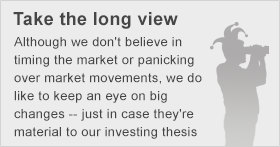
The Dow Jones Industrial Average (DJINDICES: ^DJI) was flat in Thursday afternoon trading, just a day after closing at an all-time high for the first time since Dec. 31 of last year. The impressive 16,580.84 points at the end of trading came despite a less than inspiring GDP report from the Commerce Department.
On Thursday, though, the market's focus returned to specific companies over macroeconomics. Leading the headlines are two big stories from AT&T (T +2.11%) and Ford (F +12.16%).
AT&T may open the checkbook
The Wall Street Journal reported this morning that telecom giant AT&T has approached pay-TV company DIRECTV (NASDAQ: DTV) about a potential takeover.
AT&T is interested in DIRECTV's television subscribers in the wake of consolidation in the industry. If successful, the merger would create the nation's second largest pay-for-TV network with sufficient scale to challenge the largest provider, Comcast.

The combined company would round out AT&T's offerings of telephone, broadband, and mobile with a bulked-up television service. The acquisition would likely cost AT&T north of $40 billion, DIRECTV's current market cap.
DIRECTV has long partnered with AT&T to sell AT&T's U-Verse high-speed Internet product, and in 22 states the companies collaborate to sell a co-branded version of DIRECTV's satellite TV service.
AT&T was down 0.6% at 1 p.m. EDT, while DIRECTV was up over 5% on the news.
Ford's Mullaly to step down July 1
Ford today announced that CEO Alan Mullaly will retire effective July 1 and will be replaced by current COO Mark Fields.
Mullaly will likely be remembered as one of the great automotive leaders of all time, thanks to his excellent performance through some of the darkest days the industry ever faced.
Formerly an executive at Boeing, Mullaly took the reins at Ford eight years ago just as the entire American automotive industry began to show signs of weakness.

That weakness soon turned to all-out panic as major industry players filed bankruptcy or were taken over by the government as the economy lurched into the Great Recession.
Mullaly daringly took out massive loans, using every available company asset as collateral. Credit markets dried up soon after, leaving competitors with serious liquidity issues and unable to issue new debt. Ford, meanwhile, was able to continue developing new cars that better fit consumer demand.
Under Mullaly's leadership, Ford avoided bankcruptcy and did not require a government bailout. The company posted a net loss of $12.6 billion in his first year on the job and then lost over $17 billion the following two years. However, in 2009 Mullaly righted the ship and returned Ford to profitability.
In total, Ford has earned over $40 billion in aggregate during Mullaly's eight-year tenure, including its current streak of 19 consecutive profitable quarters.
Perhaps his most underrated achievement was building Ford's management team into the class of the industry. Eight years ago, the automaker's leadership culture was divisive, slow moving, and highly political. Today, management regularly refers to its new "Let's work together" mantra, a cornerstone of Mullaly's "One Ford" vision and strategic plan.
Fields has been Mullaly's heir apparent for several months now; as a testament to his reputation, talent, and ability, Wall Street barely batted an eye on the announcement. The stock moved less than a nickel in pre-market trading. The stock was down just $0.12 at 1 p.m.